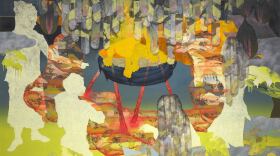http://youtu.be/zo12PP3PZpo
A new study from Duke University looks into how male sparrows express their anger. Although they are capable of fighting to the death, the new study reveals that they often wave their wings wildly before attacking in an attempt to avoid a possibly fatal brawl.
"For birds, wing waves are like flipping the bird or saying 'put up your dukes. I'm ready to fight,' " said Duke biologist Rindy Anderson.
Male swamp sparrows are territorial, and they wave their wings as an aggressive signal to defend against intruding males. " They only live a couple of years, and most only breed once a year, so owning a territory and having a female is high currency," Anderson said.
To test her hypothesis, Anderson and her co-author, former Duke engineering undergraduate student David Piech ('12), built a miniature computer with robotics that fit into a real stuffed sparrow. The result was a 'robosparrow' that looked and waved its wings just like a real male sparrow. Anderson and Piech then took the 'robosparrow' to a swamp to test the reactions of real sparrows to the wing-waving robot.
Anderson had hypothesized that the defending birds would match the signals of the intruding robots, but her team's results suggest that the males are more individualistic and consistent in the level of aggressiveness that they want to signal, she said.
The findings also are a first step toward understanding how the birds use a combination of visual displays and songs to communicate with other males. Anderson and her colleagues published the results online January 28 in the journal Behavioral Ecology and Sociobiology.







